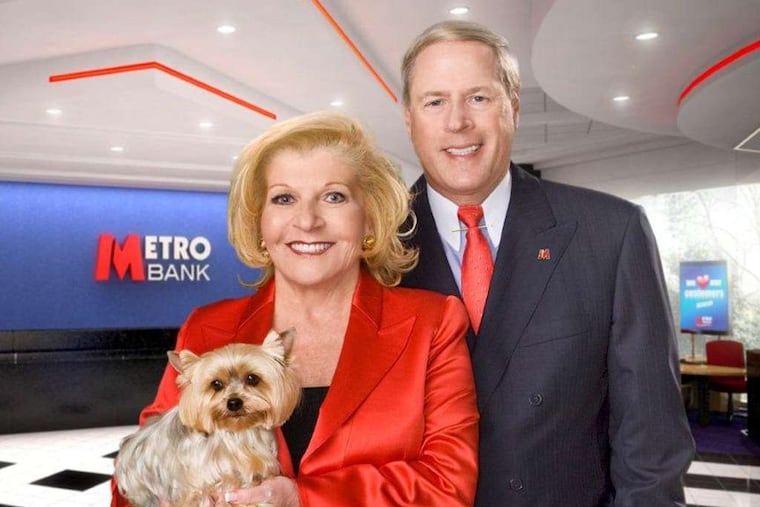U.S. sues Vernon and Shirley Hill, alleging they mismanaged a profit-sharing plan, losing millions
The lawsuit focuses on investments by a profit-sharing plan at InterArch, the design firm owned by Shirley Hill.

Lawyers for U.S. Secretary of Labor Martin J. Walsh filed a federal civil lawsuit Tuesday against Moorestown designer Shirley Hill, her banker husband, Vernon Hill, and her design company, InterArch Inc., accusing them of mismanaging InterArch’s profit-sharing plan by over-investing in Hill’s banks and losing millions of dollars that should have gone to plan members who work at the Moorestown firm.
Despite recurring criticism from regulators, shareholders and even some board members, Vernon Hill, founder of the former Commerce Bancorp and Metro Bank (UK) and chief executive of Philadelphia-based Republic Bank until July, had his banks pay tens of millions in total to InterArch since the 1970s.
» READ MORE: ‘No choice but to resign,’ says CEO of Republic Bank of Philadelphia
Hill called it money well spent developing and enforcing the banks’ brands and distinctive common look, including large red initials, rows of indoor and drive-up teller lanes to keep crowds moving, glass walls, wall murals, and other signature features.
But the Labor Department accuses the couple of having “mismanaged” the InterArch Inc. Profit Sharing Plan by putting most of its money, from 2016 until the plan was shut down in 2020, into shares of Hill’s Metro and Republic Banks, which then lost most of their value.
Calls to Shirley Hill at her office and to Vernon Hill and his longtime spokesman were not immediately returned.
The Hills “did not diversify the plan’s holdings” from 2016 to 2020, as federal retirement plan law requires, “even as the share prices of both Metro Bank and Republic Bank fluctuated,” until they ended the plan in 2020, according to the suit.
The plan was founded in 1976 as Vernon Hill began expanding Commerce from a small Cherry Hill lender into a fast-growing retail banking, insurance, and investment company that eventually operated more than 400 branches in metro Philadelphia, New York, and Washington. It was sold to Canada-based TD Bank in 2008 after Hill left Commerce following criticism of his use of InterArch and other Hill family businesses by federal regulators.
The government alleges that the Hills and Shirley Hill’s firm violated the federal Employee Retirement Investment Security Act by failing to buy a more effective mix of investments instead of concentrating on Vernon Hill’s stocks.
Specifically, the Labor Department accuses the Hills of failing to exercise their duties to the plan and its members, including the duty to diversify investments; of making prohibited transactions to benefit the Hills’ personal investments in Vernon Hill’s banks; and self-dealing.
According to the civil lawsuit, filed in U.S. District Court in Camden, Shirley Hill was the plan’s lone trustee, while Vernon Hill advised her on its investments, to the point where “Vernon Hill exercised effective control over the plan’s assets.”
The couple live in Moorestown, in a 55,000-square-foot home designed by Shirley Hill, which they call “Villa Collina,” Italian for “Hill House.”
Hill’s banks have been InterArch’s major clients. According to the lawsuit, as of February 2018, shares of Metro Bank, which Hill founded eight years earlier in London, made up about 69% of the value of the InterArch profit-sharing plan.
But over the next 15 months, the stock lost most of its value, dropping from $57 to less than $5. Still, the plan kept acquiring shares. By 2020, the shares had lost 96% of their peak value, or $17.9 million, and the plan sold them for about $731,000. (Hill left the bank in 2019 after it disclosed that loan losses were larger than previously reported to British regulators.)
Similarly, the plan bought 500,000 shares of Republic Bank’s parent company, Republic First Bancorp, in 2010, after Hill invested in the bank and before he became chairman and chief executive.
By early 2016, the Republic shares accounted for one-third of the plan’s value, dropping to about one-eighth after the plan bought Metro shares in 2016. But from 2017 to 2020 Republic shares lost most of their value, dropping to $2.05 from $9.75, and costing the plan $3.4 million. Hill was forced out of Republic in July after losing the support of a majority of its directors.